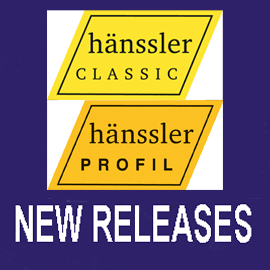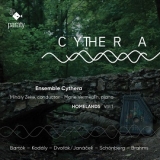 Homelands Vol. 1; Vokalwerke von Bartok, Kodaly, Dvorak/Janacek, Schönberg und Brahms; Ensemble Cythera, Marie Vermeulin, Klavier, Mihaly Zeke, Leitung; 1 CD Paraty 140100; Aufnahme 02 & 03/2020, Veröffentlichung 19/02/2021(60'32) – Rezension von Jan-Geert Wolff
Homelands Vol. 1; Vokalwerke von Bartok, Kodaly, Dvorak/Janacek, Schönberg und Brahms; Ensemble Cythera, Marie Vermeulin, Klavier, Mihaly Zeke, Leitung; 1 CD Paraty 140100; Aufnahme 02 & 03/2020, Veröffentlichung 19/02/2021(60'32) – Rezension von Jan-Geert Wolff
Die Tatsache, dass die Musik eine internationale Sprache ist und alle Grenzen überwinden kann, wird durch das häufige Zitieren nicht unwahr. Ein aktuelles Beispiel ist der neu gegründete Kammerchor Cythera, der professionelle Sängerinnen und Sänger aus nicht weniger als zehn europäischen Ländern vereint; auch sein Dirigent verkörpert das Prinzip trefflich: Mihaly Zeke wurde in England geboren, lebt in Deutschland und hat ungarisch-griechische Wurzeln. Anfang des vergangenen Jahres nahm das 24-köpfige Ensemble für das französische Label Paraty seine Debüt-CD auf: Homelands mit Werken von Zoltan Kodaly, Bela Bartok, Antonín Dvorak, Arnold Schönberg und Johannes Brahms.
Cythera liefert ein stets transparentes und homogenes Klangbild, das in allen Dynamikstufen angenehm Präsenz zeigt. Auf dem stabilen Fundament der Männerstimmen bewegen sich Sopran und Alt elegant und mit einem zuweilen erfrischend knabenhaften, silbrigen Schmelz. Diese Wendigkeit und Vielschichtigkeit spiegelt sich auch in der Werkauswahl wider, die sich angenehm vom oft ähnlichen Repertoire ähnlicher Formationen abhebt. Cythera widmet sich folkloristischer Chorliteratur aus Deutschland und Ungarn, wobei man nicht nur konturenreich Klangbilder malt, sondern dank der internationalen Besetzung auch authentisch und lebendig Geschichten aus verschiedenen „Homelands“ erzählt. So kunstvoll kann, soll und darf Folklore gerne klingen!
Vier slowakische Volkslieder von Bartok und böhmische von Dvorak (in Arrangements von Leos Janacek) sind mit Klavierbegleitung zu hören, wobei Marie Vermeulin als selbstbewusste Liedpianistin agiert, die den in die Weite weisenden Chorklang anmutig und edel koloriert. Stets kann man sich vitalem Wogen und elegantem Schweben des Klangs hingeben.
The fact that music is an international language and can overcome all borders is not untrue by the frequent citation. A current example is the newly founded chamber choir Cythera, which unites professional singers from no less than ten European countries; its conductor also embodies the principle aptly: Mihaly Zeke was born in England, lives in Germany and has Hungarian-Greek roots. Early last year, the 24-member ensemble recorded its debut CD for the French label Paraty: Homelands, featuring works by Zoltan Kodaly, Bela Bartok, Antonín Dvorak, Arnold Schoenberg and Johannes Brahms.
Cythera delivers an always transparent and homogeneous sound that shows pleasant presence in all dynamic levels. On the stable foundation of the male voices, the soprano and alto move elegantly and with an at times refreshingly boyish, silvery smoothness. This agility and complexity is also reflected in the selection of works, which pleasantly stands out from the often similar repertoire of similar formations. Cythera dedicates itself to folkloristic choral literature from Germany and Hungary, not only painting pictures of sound rich in contours, but also, thanks to the international cast, telling authentic and lively stories from various ‘homelands’. Folklore can, should and may sound this artful!
Four Slovak folk songs by Bartok and Bohemian ones by Dvorak (in arrangements by Leos Janacek) are heard with piano accompaniment, with Marie Vermeulin acting as a self-confident song pianist who gracefully and nobly colors the choral sound.





















